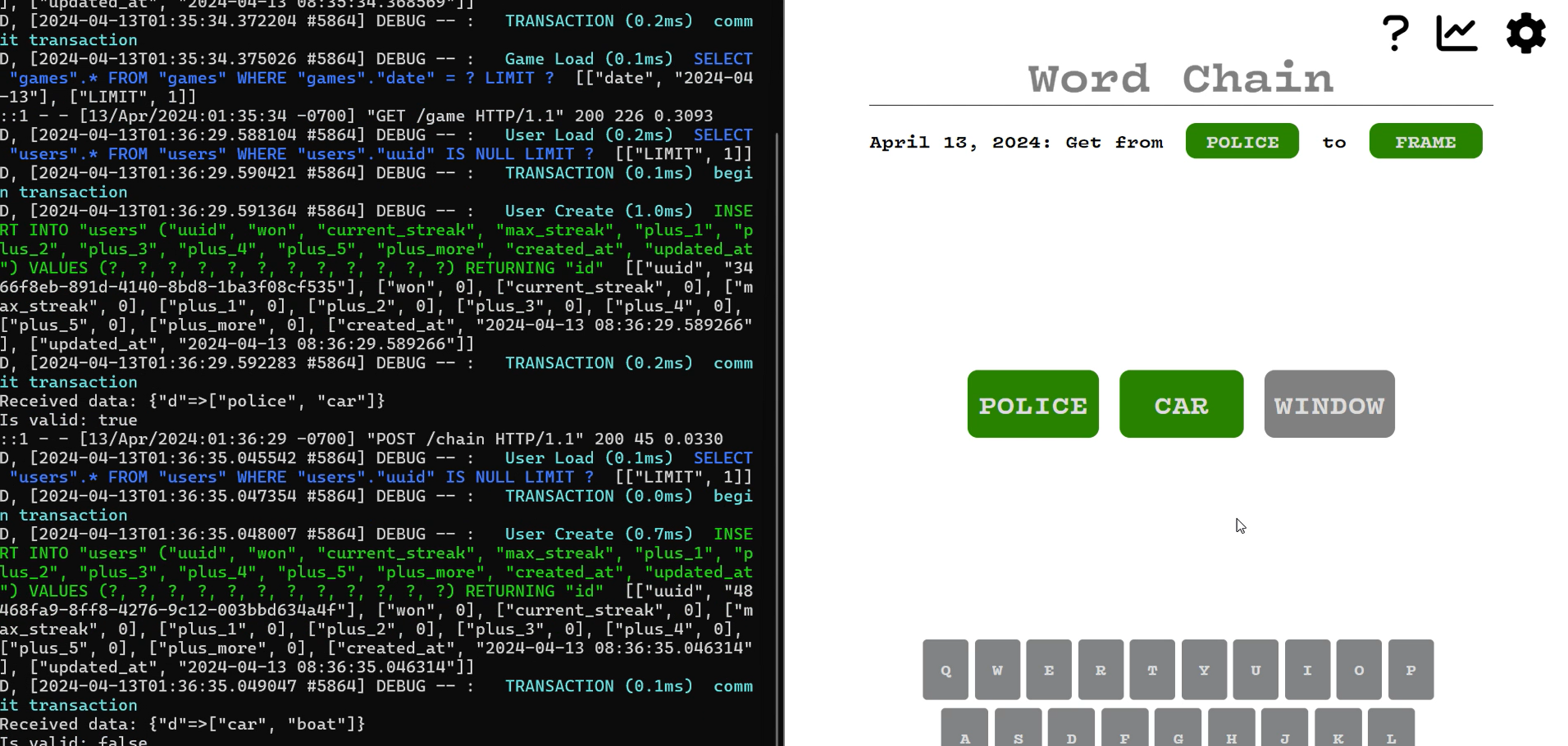Word Chain
A web-based word game
Compound Noun Chain Game
This is a we-based daily game (like wordle) where players find a chain of compound nouns from noun-A to noun-B. Each entered noun is validated to form a compound noun with the previous noun. If a prefix chain is invalid, progress cannot be made until the last noun in the chain is cleared and replaced with a valid compound. If noun-B is reached, the user’s solution is registered, something celebratory happens, and the user’s cumulative stats are shown.

🧩 Wordchain Game Backend
My dad invented this game, but I wrote the whole backend and frontend implementation. I coded the app with Ruby and the Sinatra framework. It utilizes ActiveRecord for database management and Redis for fast caching and word validation.
The backend handles:
- User interaction and session tracking
- Word chain validation logic
- User statistics management and persistence
🔧 Technologies Used
- Sinatra – Lightweight Ruby web framework for HTTP routing
- ActiveRecord – ORM for interacting with the database
- Redis – In-memory data structure store for compound noun validation
- Rack::Cors – Middleware for Cross-Origin Resource Sharing
- SQLite3 – Simple file-based relational database
📁 Project Structure
app.rb
Main Sinatra app file:
- Defines core API routes:
GET /game– Retrieve game dataGET /stats– Get user statisticsPOST /chainandPOST /soln– Validate submitted word chains
- Initializes Redis
- Includes helper methods for standardized responses and validation
models/user.rb
Defines the User model with the following attributes:
uuidwoncurrent_streakmax_streak
These fields track user-specific performance stats.
models/init.rb
Initializes all models:
UserGameSolution
db/schema.rb
Represents the current schema definition for the SQLite3 database:
- Tables:
users,games,solutions
db/migrate/...
Includes a migration that updates the shortest_path column in the games table (from string to integer).
utils/csv2redis.rb
Utility script for populating Redis from a CSV file:
- Normalizes compound nouns
- Loads them into Redis for fast lookup during gameplay
spec/app_spec.rb
RSpec tests to verify:
- Core routes (
/,/game,/stats) are working correctly - Application behavior meets expectations
Gemfile
Declares all gem dependencies:
sinatra,activerecord,redis,rspec, etc.
config.ru
Rack configuration file used to launch the Sinatra server.
Rakefile
Defines database tasks using Rake and ActiveRecord, such as:
db:migratedb:seed
🚀 Purpose and Architecture
The backend serves as the core logic engine for a wordchain game. It:
- Validates compound nouns using Redis for quick access
- Tracks and persists user streaks and wins
- Provides HTTP endpoints for frontend integration
Components:
| Layer | Technology | Role |
|---|---|---|
| Web Server | Sinatra | Handles HTTP requests |
| Persistence | SQLite3 | Stores user and game data |
| Caching/Logic | Redis | Validates compound words and fast lookup |
| ORM | ActiveRecord | Maps Ruby objects to DB records |
Dictionary API
The Dictionary API validates prefix chains of compound nouns:
GET /q?w[]=cow&w[]=bell&w[]=hop&…
It responds with JSON {“result”:0} or {“result”:1} indicating whether the given array of words is a valid chain of compound nouns.
Backend API
The API endpoints are as follows:
GET /game
Responds with the daily game. E.g.
{“from”:”dog”,”to”:”blade”,”steps”:6,”expires”:ts}
GET /stats
Responds with the user’s stats. E.g.
{“played”:100,”won”:60,”current_streak”:6,”max_streak”:10,”dist”:[60,20,10,2,1,1,7]}
“dist” is a distribution of the user’s solutions: +0 (i.e. shortest valid solution), +1, +2, +3, +4, +5, +more than 5.
PUT /soln
Allows the user to submit a solution to the daily game. Responds with a success Boolean and the updated user stats.
Tables
Games
Associations: has_many solutions
Fields: Game number, Date, Start word, End word, Shortest path
Users
Associations: has_many solutions
Fields: UUID, Won, Current_streak, Max_streak, Plus_1, Plus_2, Plus_3, Plus_4, Plus_5, Plus_more
Solutions
Associations: belongs_to Game, belongs_to User
Fields: User_id, Game_id, Timestamp, Chain (comma-separated list of words)
Authentication
Anonymous identity is provided through a UUID stored in a cookie. Best practices should be adopted for using this cookie to create a secure authenticated session with the user.
Game Generation
Daily games will be pre-generated (e.g. a year in advance) with offline tools that Ben and Louis have written, manually created, and stored in a table on the backend server.